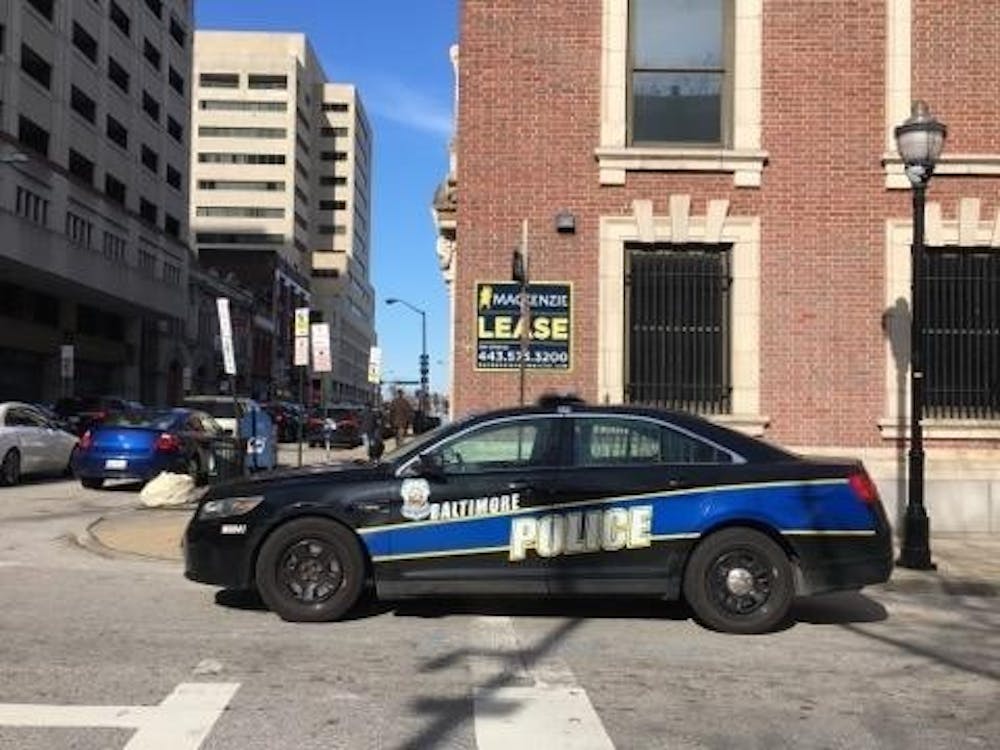The Judiciary Committee of the Maryland House of Delegates voted 13-8 to approve legislation that would authorize Hopkins to create a private police force. Committee members advanced the bill on Thursday, March 21 after passing several amendments to the legislation.
New amendments include the requirement that officers have their body cameras on; restrictions on purchasing surplus military equipment; and the requirement that a member of the Black Faculty and Staff Association serve on the University Police Accountability Board.
During testimony, President of the Johns Hopkins Health System Kevin Sowers pointed to an incident on March 14 when a stray bullet hit a window in the Skip Viragh Outpatient Cancer Center at the Hopkins Hospital. According to Sowers, this demonstrated the need for a private police force.
“There were two of our employees in that building at the time the bullet entered the building,” Sowers said during his testimony. “Within minutes, a victim — a local member of our community — arrived in our emergency room with a fatal head wound.”
Some members of the student body and the Baltimore community have expressed opposition to the bill. They have raised concerns over racial profiling and the presence of armed officers on campus.
Lester Spence, an associate professor of Political Science and Africana Studies, opposes the bill. He noted that he does not know any black faculty at Hopkins who support the bill.
“Not just do a number of faculty agree with me, but it’s important to note that there are no black faculty that support the police department,” Spence said. “In fact, all the black faculty that I know strongly oppose it.”
He believes that the oversight committee, even with the amendment, will not have the power necessary to make a substantive impact on the force.
“That board, like most of the bill’s review boards, doesn’t really have teeth. So at best you’re talking about a single person on what’s supposed to be a 15 member board,” he said. “That’s a diversity initiative that doesn’t make much sense.”
Spence also criticized the University’s use of the faces and names of black professors, such as Political Science and Sociology Professor Vesla Weaver and English and History Professor Lawrence Jackson, in material related to the police force.
Both Weaver and Jackson were members of panel discussions intended to solicit community feedback on the proposed police force. Their research, pictures and names are included in the Interim Study Report, which Hopkins released in December. Hopkins created the report after Maryland State legislators asked the University to conduct more research on its proposed private police force.
“They’ve promoted literature, putting [Weaver and Jackson’s] faces on it, as if they supported the proposal,” Spence said.
Both Weaver and Jackson have signed an open letter from over 100 faculty members who oppose the creation of a private police force.
Spence also stated that he is particularly worried about the effects that the police force would have on black students and faculty members. According to Spence, police forces disproportionately target people of color. He believes that a Hopkins-funded force would have the same problem.
“I was concerned for black staff and black students on campus who tend to be the bodies that are most heavily policed,” Spence said.
Spence noted that black students at Hopkins are concerned about the effects of a police force. He said that several students have come to him to express their fears about the future force.
“On two occasions, students came to me. In one case, a group of students that I was speaking to, and then in another case a student that I mentor came to me explicitly with concerns,” Spence said. “Then one of the black parents came to me with concerns.”
Political Science graduate student Quinn Lester, a member of Students Against Private Police (SAPP) remains strongly opposed to the bill. Lester’s studies on the effects of policing on communities have encouraged him to protest the bill.
“In my academic work, I study policing, so I’ve seen that a lot of scholarship that shows that the plans that Hopkins is pursuing and talking about won’t work the way they say they will work,” Lester said.
According to Lester, methods other than policing can reduce crime rates.
“Police do not have a significant impact on crime in these cases — larger social forces do,” Lester said. “The bill only mandates police to investigate property theft crimes, but the reports show again and again that police are never around to investigate property theft.”
Lester thinks that the bill’s lack of support from progressive Democrats indicates that the bill is out of touch with some of the more powerful groups in Annapolis, Md.
“I would note that in the vote, all progressive democrats in that committee voted against that bill,” Lester said. “The bill passed because all the Republicans supported it, the two Baltimore City delegates and Democratic leadership. I don’t think that the bill has the backing of more progressive voices in Annapolis.”
As of press time the bill is awaiting its final vote in the House chamber.





